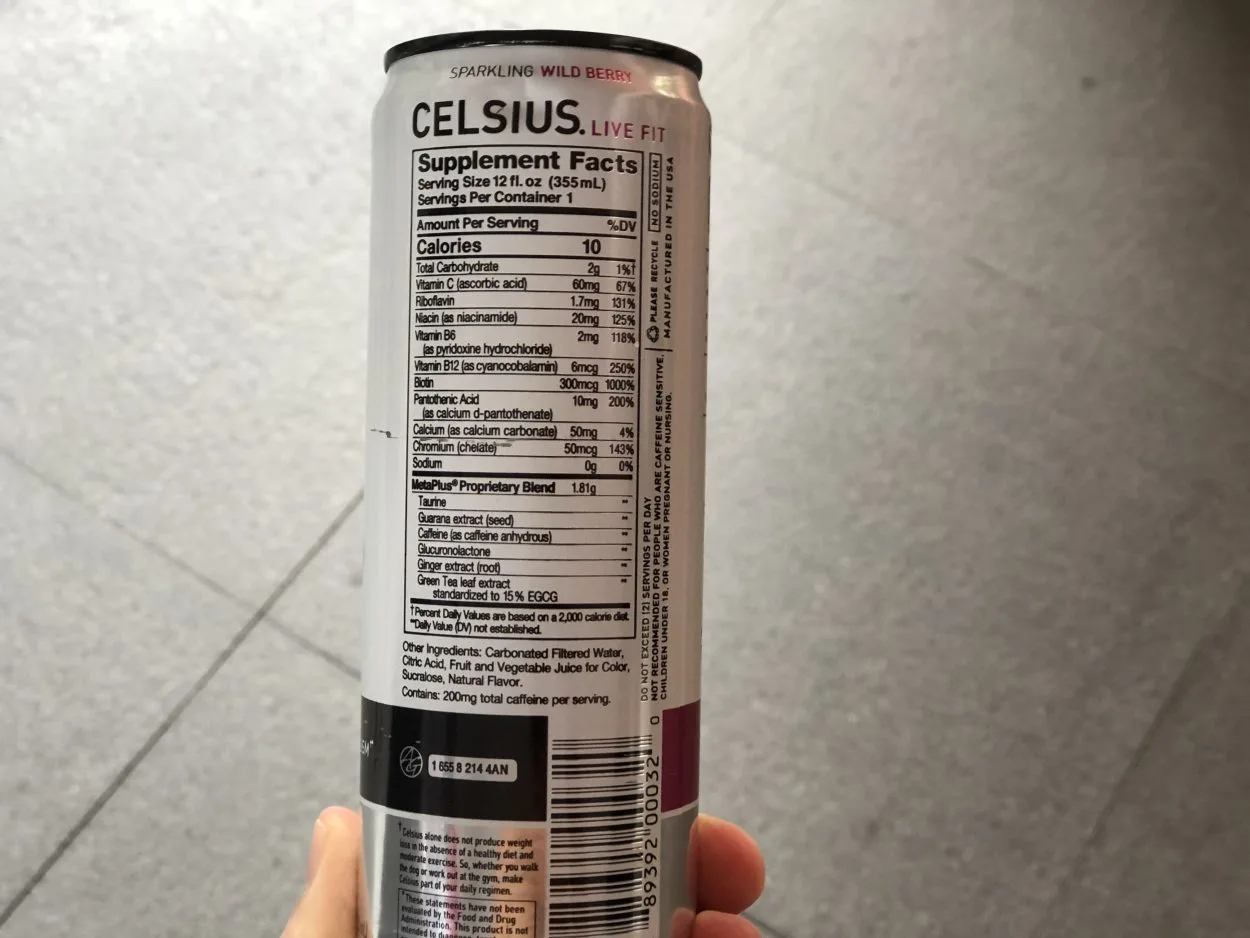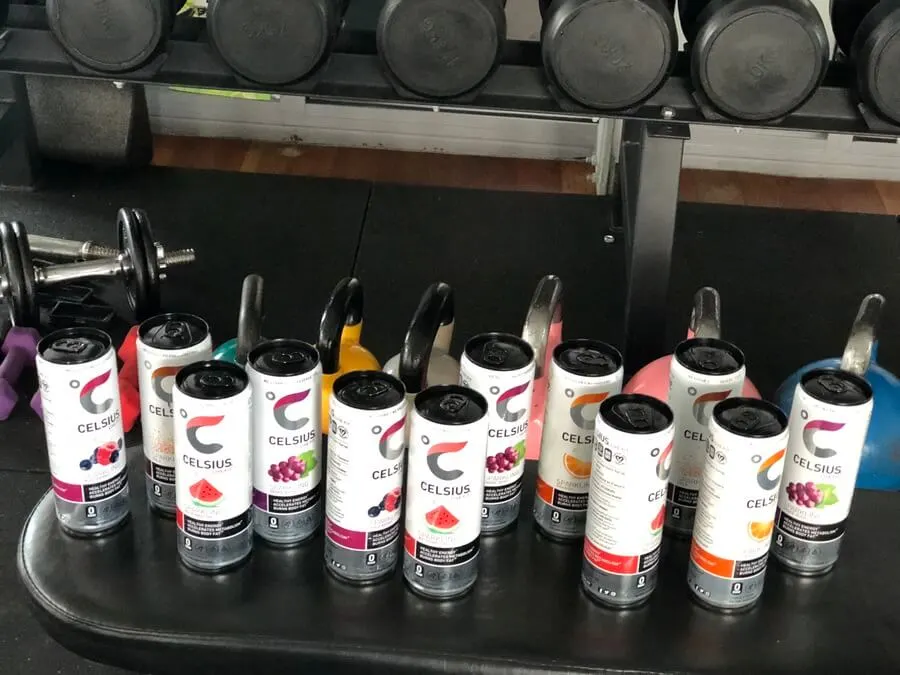Humans resort to different means to keep their bodies in tip-top shape. Some people prefer gluten-free foods because they believe they can help control health problems such as headaches, depression, and weight gain.
The energy drink industry has come a long way, it even developed in a direction where every kind of diet can be catered to easily. Yup, you won’t have to miss that carbonated fizz just because you’re excluding gluten in your diet!
One noteworthy gluten-free energy drink is Celsius, and it boasts of high-quality ingredients such as green tea, guarana, ginger, and other nutrients. Gluten-free and jam-packed with nutrition?
Yup, that’s Celsius for you! The best part is that it is free of sugar, aspartame, artificial colors, flavors, and preservatives. It also contains MetaPlus Blend, a proprietary thermogenic formulation that claims to burn calories and improve metabolism.
Let’s explore more about the qualities of Celsius and how it became a gluten-friendly caffeinated beverage.
Contents
What Does Gluten-Free Mean?
As a controversial product, the opinion of gluten among health experts is divided. While some think that it’s harmless, a few dieticians believe that it is harmful.
Gluten is a protein found in the following:
- Wheat
- Barley
- Rye
- Triticale (a cross between wheat and rye)
For food to be gluten-free, the gluten content of food needs to be less than 20 parts per million (ppm).
A gluten-free diet is crucial to preventing celiac disease and a variety of other celiac-related illnesses. Celiac disease is an auto-immune disease. In every 133 Americans, one is diagnosed with celiac disease.
It is characterized by a compromised immune system that damages the small intestine lining due to gluten consumption. These damages prevent nutrients from being absorbed from food over time.
The gluten can cause damage to the lining of the intestines and damaged intestines can lead to:
Celsius Energy Drink Ingredients
Celsius comes in 4 different drink variants, each having different ingredients. Here are 4 Celsius energy drink variations:
- Originals
- Sweetened with Stevia
- On-the-go
- Heat

Celsius Original has the following ingredients:
- Vitamin C
- Riboflavin
- Niacin
- Vitamin B6
- Vitamin B12
- Biotin
- Pantothenic Acid
- Calcium
- Chromium
- Carbonated Water
- Citric Acid
- Fruit Juice
- Vegetable Juice
- Sucralose
- Natural Flavour
Celsius Sweetened has the following ingredients:
- Dietary Fibre
- Vitamin C
- Riboflavin
- Niacin
- Vitamin B6
- Vitamin B12
- Biotin
- Pantothenic Acid
- Calcium
- Chromium
- Sodium
- Carbonated Water
- Erythritol
- Citric Acid
- Natural Flavor
- Stevia Rabaudiana Leaf Extract
- Vegetable Juice
Celsius On-the-Go which is in powdered form has the following ingredients:
- Vitamin C
- Riboflavin
- Niacin
- Vitamin B6
- Vitamin B12
- Biotin
- Pantothenic Acid
- Calcium
- Chromium
- Citric Acid
- Natural Flavor
- Sodium Bicarbonate
- Sucralose, Erythritol
- Annato
- Silicon Dioxide
Celsius Heat has the following ingredients:
- Vitamin C
- Riboflavin
- Niacin
- Vitamin B6
- Vitamin B12
- Biotin
- Pantothenic Acid
- Calcium
- Chromium
- Citrulline
- Carbonated Water
- Citric Acid
- Natural Flavor
- Fruit Juice
- Vegetable Juice
- Sucralose
Take a look at this article to know more about each ingredient in-depth.
Celsius Caffeine Content
Celsius Energy Drinks have a caffeine content ranging from 200 to 300 mg. This depends on the variant you are consuming.
Check out this table below to know the caffeine content of each Celsius Variation:
| Variant | Caffeine Content |
| Original | 200 mg |
| Sweetened with Stevia | 200 mg |
| On-the-Go | 200 mg |
| Heat | 300 mg |
All variants of Celsius contain 200 mg of caffeine, with Heat being the exception at a whopping 300 mg. This definitely falls on the upper-level category when it comes to energy drinks in the market.
This will certainly boost your mood and give you that hyperactive kick for the following days to come! It’s probably not a good idea to consume that much caffeine though since you’ll be heading into ‘unsafe’ territory.
This particularly applies to the Celsius Heat variety as it is on the threshold of the daily caffeine consumption recommended for healthy humans. The United States Food and Drug Administration recommends 400 mg per day, with 200 mg per serving each consumption.
There is a warning on the can about not exceeding two servings daily. Personally, I find this much caffeine excessive as I usually get the buzz between the 80 to 100 mg level.
Caffeine overdosing can be hazardous for health. Some of the symptoms can be as below:
- Digestive issues
- Anxiety
- Insomnia
- Highblood pressure
- Bleeding Disorders
- Diarrhea
- Osteoporosis
You can get high blood pressure by ingesting more than 200mg of caffeine in one serving. So I suggest you limit your intake of Celsius variants to half a can or so especially if you’re not caffeine tolerant.
Stay within the recommended caffeine limits and moderate your consumption of Celsius energy drinks in order to prevent adverse effects.
You can learn more about caffeine and its effects here in this video:
Celsius Sugar Content
Despite being sugar-free, Celsius Energy contains artificial sweeteners like Sucralose and Stevia and sugar substitutes like Stevia.
For Celsius Originals and Celsius Heat, Sucralose is substituted for regular sugar. Celsius Naturals and Celsius On-The-Go’s sugar content is substituted by Stevia and Erythritol respectively.
Here you can take a closer look at all these artificial sweeteners.
Erythritol
It is a carbohydrate substance called sugar alcohol that can be used as a substitute for sugar. As well as being naturally present in some foods, it is also used in the fermentation of wine, cheese, and beer.
Sweeteners provide the benefit of allowing you to drink sugar-free energy drinks like Celsius without feeling guilty about their calories. It doesn’t mean you can consume them infinitely, though.
Excessive consumption of sugar additives can cause:
Stevia
Stevia is a zero-calorie sweetener made from the leaf extract of the stevia plant, which is another option.
The sugar in this product is around 200 times sweeter than regular sugar. Stevia is used in Celsius Naturals and is generally well tolerated by diabetics. A heads-up though is that products containing maltodextrin or dextrose should be avoided.
Sucralose
Sucralose, commonly referred to as Splenda, is a zero-calorie sweetener. Most of the packaged food and beverage products contain this particular additive because it’s FDA-approved.
Sucralose is designed to enhance the taste of food and beverages. It is important to know before consuming it that it is about 400 to 700 times sweeter than sugar.
The advantages of sucrose include its ability to prevent cavities over time as well as to control weight.
Celsius Calorie Count
The average consumption of Celsius energy drinks contains around 10 to 15 calories. Various Celsius energy drinks contain different amounts of calories.
For an energy drink of its size, Celsius Energy has an extremely small amount of calories. It won’t even make a dent in the daily calorie limit for healthy individuals.
The recommended daily calorie intake for women is 2000 to 2400 calories and for men, it is 2400 to 3000 calories.

Celsius’ moderate calorie content means you don’t have to worry about it impacting your daily calorie count if you’re on a diet! Although its caffeine content is a cause of concern, risks can easily be avoided if you consume it in moderation.
The energy drink shouldn’t be substituted for a nutritious and filling meal; however, you should not replace your meals with Celsius.
What problems can Celsius cause?
Anxiety, sleeplessness, and increased heart rate are just some of the negative impacts that might result from being exposed to Celsius. People under the age of 18 shouldn’t consume this.
Caffeine content is 200mg per serving, therefore restrict yourself to no more than 1 serving per day. There have been rumors that Celsius has damaged people’s livers, but experts believe that consuming too much coffee, in general, might have the same effect. The lesson to be learned is that excessive consumption is harmful.
What makes Celsius banned?
Although the drink contains 200 milligrams of caffeine, which is roughly equivalent to two standard cups of coffee, the NCAA has banned it because it contains an ingredient that is prohibited in its whole.
Since guarana extract is one of its constituents, Celsius is illegal since it is against NCAA rules.
Can celiacs drink energy drinks?
Energy drinks are generally safe for people with celiac disease since they are not produced with components that contain gluten.
Even while a majority of energy drinks are safe for those with gluten sensitivities, only a few of them actually declare themselves as gluten-free, and even fewer have been verified as such.
Can Celsius Help in Burning Fat?
Celsius energy drink is not able to directly burn fat but it can boost your metabolism to aid fat burning and help with weight loss.
As well as increasing metabolism, caffeine can also help burn fat. Caffeine also has the ability to keep you full for longer periods by suppressing your hunger.
One of the benefits of caffeine is that it can provide you with an energy boost to work out for a longer time. Longer and effective workout sessions can help you lose weight.
No matter if you’re working out at the gym or running, Celsius will help you burn off those calories. Yup, you read that right. You will need to put on some work to shave off those stubborn fats.
You need to understand that drinking Celsius won’t make you magically lose weight; you also need to exercise regularly and follow a healthy diet to achieve the results you desire.
I made a list of other diet-friendly energy drinks, you may want to check it out.
Is Celsius a Healthy Energy Drink?
Depending on the amount you consume, Celsius energy drinks may be good for you or bad for you. I am a firm believer that no human product is bad in itself, it depends on the person consuming or using it.
What I can infer is that due to its ingredients, Celsius is one of the healthiest energy drinks on the market. Let’s have a look at the good side of the Celsius Energy Drinks.
With hardly any calories and no sugar, Celsius Energy makes a healthier choice than many other energy drinks out there. There are also plenty of natural ingredients in Celsius that can help you stay focused and perform better.
There is one particular worry to discuss when talking about Celsius – its caffeine content. While it does not logically reach the daily caffeine limit for adults, it still is high and belongs in the upper tier caffeine level.
Caffeine may have negative effects on people with low caffeine metabolism, so Celsius is not recommended for everyone.
For a more extensive explanation, here is an article explaining in detail whether Celsius is bad for you.
Celsius Energy Drink Alternatives
Here are some alternative energy drinks that you can try out:
Notable Mentions
Conclusion
As a gluten-free energy booster, Celsius is a great choice for anyone on a gluten-free diet, as well as anyone seeking an energy boost that truly delivers. It’s a healthy caffeinated beverage that will only give upsides when taken correctly!
For people with gluten intolerance, Celsius energy drinks can be considered the go-to beverage. It does not contain traces of wheat, barley, or rye.
Gluten-free diets have many benefits and drawbacks, which are often misunderstood by all. In addition to its effectiveness in treating gluten-related symptoms, it also contains nutrients that are good for your overall health.
I would highly recommend it if you would like to feel refreshed and energized while keeping a gluten-free diet!
